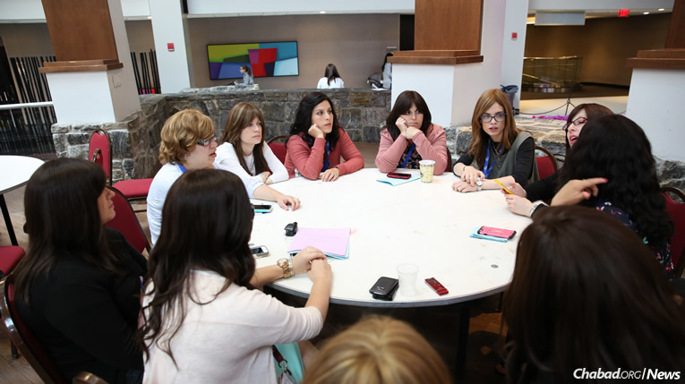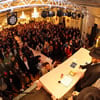Campus Chabad-Lubavitch emissaries are often the first responders when students face personal crises, according to an article in the current issue of the Los Angeles Jewish Journal. The report illustrated how in addition to Chabad’s popular Shabbat meals, holiday programs, Torah-study sessions and other campus activities, Chabad emissaries are frequently the ones being approached by students during their times of need.
The Jewish Journal story was triggered by a recent groundbreaking study of the Chabad-Lubavitch movement’s rapidly growing presence and impact on university campuses worldwide. The wide-ranging independent study, commissioned and funded by the Hertog Foundation, analyzed survey data from more than 2,400 alumni under the age of 30, and conducted extensive interviews with students, parents, faculty, and local Chabad and Hillel leaders at 22 campuses served by Chabad.
“We heard stories of emissaries bailing students out of jail for drunk driving, consoling them when a close friend has an illness or spending time with them when a loved one dies,” according to the study, written by social scientists Dr. Mark I. Rosen and Dr. Steven M. Cohen, along with Arielle Levites and Dr. Ezra Kopelowitz.
The “four Jewish studies researchers spent the better part of 134 pages trying to quantify the impact these houses have on the college students who frequent them,” writes Eitan Arom in the Jewish Journal article. “Buried about halfway through it was this curious fact ,” that he says, “defies metrics”—namely, that students in crisis turn first to Chabad emissaries. “But it wasn’t news to many Chabad rabbis and rebbetzins reading the document.”
Arom quotes Rosen, who presented the results to a group of Jewish professionals at the Jewish Federation of Greater Los Angeles in December and served as the study’s lead author, as saying that he, too, wasn’t surprised by this particular finding.
“Kids who are away from home, they don’t always want to tell their parents what’s going on,” Rosen told the Jewish Journal.

“Unlike Hillel houses, Chabads are built around the family of the campus emissary, with home cooking and toddlers often scurrying underfoot,” writes Arom. “The study authors didn’t formally address Hillel, but suggested that the family-like atmosphere of Chabad Houses played a part in its attraction for students, giving them a place to bring their personal struggles.”
He later adds that “it’s not only rabbis, but also their wives who are called on to provide emotional and spiritual support. In cases of sexual assault, for instance, female students sometimes seek out the rebbetzin for support.
“Elisa Gurevich [co-director of Chabad at UCLA] said students sometimes use their home as a safe space after being attacked. Once, she accompanied an undergraduate to file a police report after a rape. And she’s visited students at the psych ward at UCLA more times than she can count, on occasion bringing along one of her older children.”
Read the whole story here.









Start a Discussion